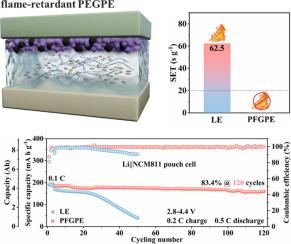Energy Storage Materials ( IF 18.9 ) Pub Date : 2023-12-16 , DOI: 10.1016/j.ensm.2023.103124 Borui Yang , Yu Pan , Ting Li , Anjun Hu , Kun Li , Bin Li , Liu Yang , Jianping Long

|
Lithium metal anodes coupled with nickel-rich cathodes promise high-energy-density batteries. Nonetheless, the overall safety of lithium metal batteries is compromised by the use of conventional thermally unstable and flammable carbonate-based electrolytes, which hinders their practical applications, especially under abuse conditions. Herein, a flame-retardant perfluorinated gel polymer electrolyte (PFGPE) is developed by in situ copolymerization of perfluorobutyl acrylate (PFBA) monomer with pentaerythritol tetraacrylate (PETEA) crosslinker. PFBA decomposes at high temperatures to generate fluorine radicals that eliminate hydrogen and hydroxyl radical chain combustion reactions in the gas phase, reducing the combustion risk of electrolytes. Additionally, the co-pyrolysis of the carbonate-based electrolytes and the copolymerization matrix produces a P- and F- containing char layer in the condensed phase, blocking the heat and oxygen required for combustion. A large-format PFGPE modified Li metal pouch cell (4.4 Ah, 381 Wh kg−1) achieves 120 cycles with 83.4% of capacity retention under a lean electrolyte of 3 g Ah−1 and a negative/positive capacity ratio of 1.82. Moreover, the modified pouch cell exhibits enhanced thermal safety characteristics and passes international standard tests (GB/T 31485–2015) for mechanical nail penetration and thermal abuse. This innovative approach represents a significant milestone towards the advancement of high-safety Li metal batteries.
中文翻译:

采用阻燃全氟凝胶聚合物电解质,可用于极端滥用条件下的高安全性锂金属软包电池
锂金属阳极与富镍阴极相结合有望实现高能量密度电池。尽管如此,锂金属电池的整体安全性因使用传统的热不稳定且易燃的碳酸盐基电解质而受到损害,这阻碍了它们的实际应用,特别是在滥用条件下。本文通过全氟丙烯酸丁酯(PFBA)单体与季戊四醇四丙烯酸酯(PETEA)交联剂的原位共聚开发了阻燃全氟凝胶聚合物电解质(PFGPE)。PFBA在高温下分解产生氟自由基,消除气相中的氢和羟基自由基链式燃烧反应,降低电解液的燃烧风险。此外,碳酸酯基电解质和共聚基质的共热解在凝结相中产生含P和F的炭层,阻挡燃烧所需的热量和氧气。大型PFGPE改性锂金属软包电池(4.4 Ah,381 Wh kg -1 )在3 g Ah -1贫电解液和1.82的负/正容量比下实现了120次循环,容量保持率为83.4%。此外,改进后的软包电池表现出增强的热安全特性,并通过了机械钉穿透和热滥用的国际标准测试(GB/T 31485-2015)。这种创新方法是高安全性锂金属电池发展的一个重要里程碑。





























 京公网安备 11010802027423号
京公网安备 11010802027423号